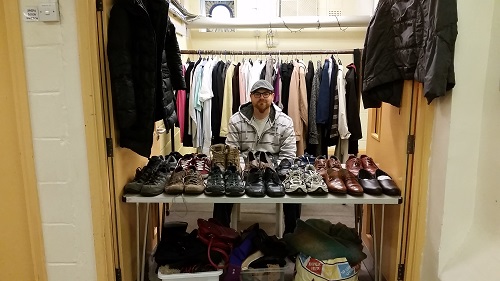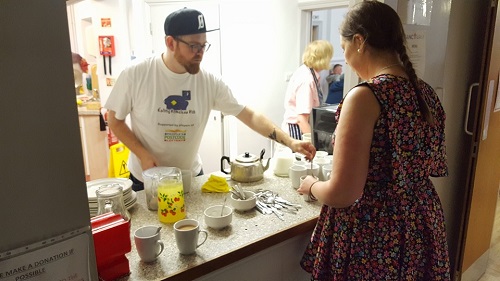The Ealing Worker Who Really Understands Homelessness
Andrew Mcleay says sleeping out in the snow was one of the hardest nights of his life

|
Andrew Mcleay is the designated Ealing Churches Worker at Ealing Soup Kitchen which helps many homeless people in the borough by providing food and company at regular drop-ins at St John's Church in Mattock Lane and the Salvation Army in West Ealing.
An Australian who has lived in London for around nine years Andrew has previously worked in the field of mental health and has himself been homeless.
He spoke to freelance reporter Rory Thomas:
'' I don’t know if you’ve ever tried sleeping on the street? I wouldn’t recommend it. I came over here on a whim, I had my life savings and I thought I’d be fine.
What could go wrong? I came to stay with my sister who I didn’t really know as well as I used to and the relationship wasn’t as rosy as I’d have liked. As a result, when I stayed with her I stayed on the couch and, her son needed to move back and the only space was the couch. I didn’t want to say anything about having nowhere to go, so I just left.
I was a bit prideful – and I just thought I might find a hotel but I didn’t know Ealing so ended up sleeping behind a bin. It snowed in the night, I didn’t have any cardboard, I didn’t know what I was doing.
I had a viewing the next day in Acton and I just told myself I didn’t care what it was, whether it was infested with rats, I was going to take it! That was one of the hardest nights of my life and the precipitating factor for getting involved with the homeless.
In your opinion, are there common circumstances that make someone homeless?
There are some with quite serious mental health issues, or maybe they’ve just come out of jail, alcohol, drugs, it could be a lapse in medication because it’s been stolen or whatever. There are those who present as stable, but I don’t think I’ve ever met anyone on the street who doesn’t have mental health issues.
If you or I were to go on the street, there’s a point where your contacts are used up, and you say “Okay I might have to go to a soup kitchen”. But then you think “I don’t want your free food, I’ll pay for it”. Then you realise you don’t have any money and then your pride stops you from saying “No”, and after that pride dies, all you left with is “Yes” and then “Yes” just becomes your default. So if someone offers you anything, you just take it. And that becomes quite extreme, almost a mental health condition. Over time it just becomes so ingrained you forget the worth of things and that impacts their mental health with regards to employment, because there is no “worth” in a job. Why would you work when everything is potentially available? So there is a disconnect there.
So mental health is a major factor?
I used to work for a company that dealt with low-level mental health issues: phobias, depression, anxiety, things I think everybody has in their life at some point. What usually happens is you get a small bout of depression which goes unaddressed, it gets worse, and then its gets to the point where it starts to impact the relationships in your life. It’s a funny thing mental health, and I feel like I’m stereotyping here, but I feel like it’s worse for men, because men, generally, don’t get help – women do. Guys don’t go to the GP, or the doctors or mental health professional because “they’re all fine”.
There are definitely more men, but there are women on the street too, it’s just that the ones who are on the street have gotten to a position that prohibits them from getting back to the life they used to lead. The council, generally, consider women more vulnerable, just by gender, than men. So, therefore it’s arguably easier for them to get off the streets, and that’s why you do see an imbalance. But you still see a lot of women with similar issues”.
How do you feel society reacts to the homeless?
I deal with a lot of the public who want to volunteer, and sometimes, by the way, we get seventy or eighty people a night! Some want to do it once, or to appease their conscience, but it’s always the same response: “They (the service users) are just so lovely and I really enjoy feeding them”. But they don’t see the culture that I see, not being in it full-time. It’s about balance and it’s important to love everyone but also to understand everyone.
What is procedure with new clients? Is there a “starter pack”?
We’ve got this new thing called a home starters kit which we have just started rolling out. There is a magazine called The Pavement, which tells you all the soup kitchens and so on.
What we do generally is we give someone a sleeping bag, top up their Oyster Card, and will try to put them in touch with Mungo’s or Street Link, places to get food etc. If they need some counselling or housing support I will try and make an appointment for them.
What are the challenges going forward?
Homelessness seems to be getting worse. When I started, I would walk along the streets and I knew the people sleeping outside. Now, I’m seeing a whole bunch of people I don’t know. Every Monday night there is someone at the soup kitchen I don’t know. Every single week! Which is scary because the service needs to expand, but where is the money coming from? How do you fund that? So a lot of my job now is dedicated to fundraising and awareness, so people see this is a good cause and want to help.
The best days I have in this job are when I see a person once and then never see them again, because it means they’ve taken the help.

You can find more info on Ealing Churches and Ealing Soup Kitchen here
2nd November 2016